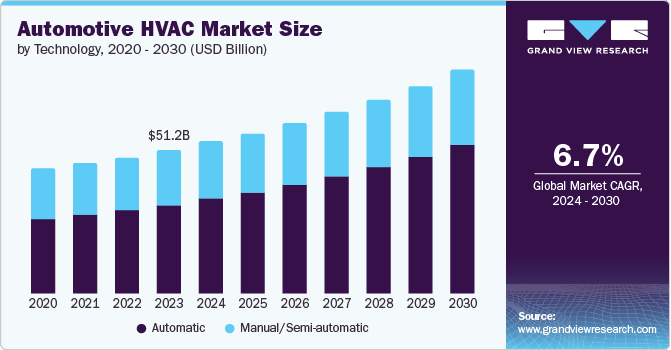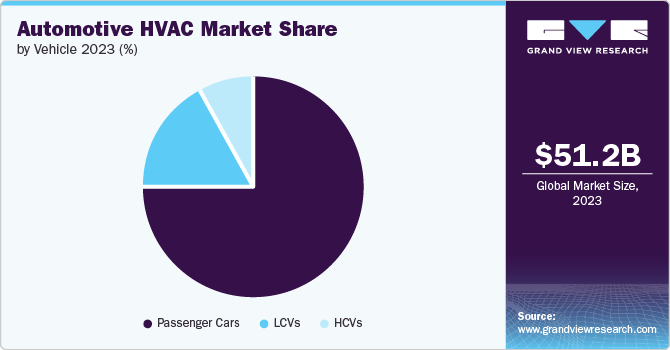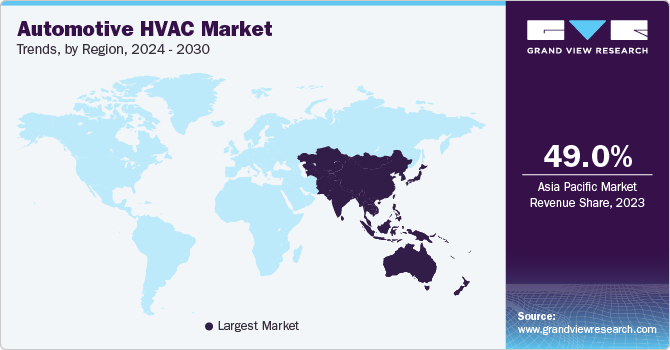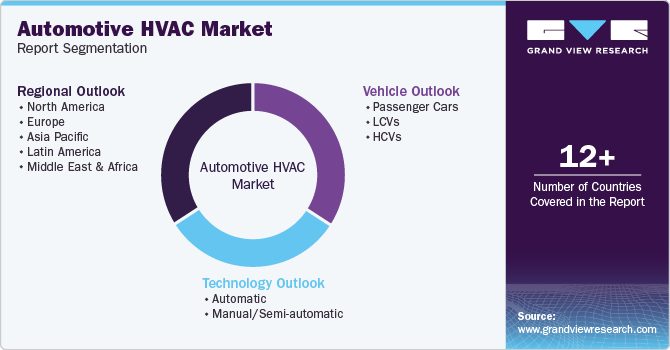- Home
- »
- Automotive & Transportation
- »
-
Automotive HVAC Market Size, Share & Growth Report, 2030GVR Report cover
![Automotive HVAC Market Size, Share & Trends Report]()
Automotive HVAC Market (2024 - 2030) Size, Share & Trends Analysis Report By Technology (Automatic, Manual/Semi-automatic), By Vehicle (Passenger Cars, LCVs, HCVs), By Region, And Segment Forecasts
- Report ID: 978-1-68038-672-1
- Number of Report Pages: 100
- Format: PDF
- Historical Range: 2018 - 2022
- Forecast Period: 2024 - 2030
- Industry: Technology
- Report Summary
- Table of Contents
- Segmentation
- Methodology
- Download FREE Sample
-
Download Sample Report
Automotive HVAC Market Summary
The global automotive hvac market size was estimated at USD 51.16 billion in 2023 and is projected to reach USD 79.59 billion by 2030, growing at a CAGR of 6.7% from 2024 to 2030. The rising demand for passenger comfort and safety features in vehicles has fueled the adoption of advanced HVAC systems.
Key Market Trends & Insights
- Asia Pacific automotive HVAC market registered the largest market revenue share of 49.0% in 2023.
- India automotive HVAC market is anticipated to grow significantly over the forecast period.
- Based on technology, Automatic is the most lucrative technology segment registering the fastest growth during the forecast period.
- Based on vehicle, Passenger cars accounted for the largest market revenue share of in 2023.
Market Size & Forecast
- 2023 Market Size: USD 51.16 Billion
- 2030 Projected Market Size: USD 79.59 Billion
- CAGR (2024-2030): 6.7%
- Asia Pacific: Largest market in 2023
Consumers are increasingly seeking vehicles with efficient climate control systems, driving the growth of the automotive HVAC market. Additionally, the growing trend of electric and hybrid vehicles has led to an increased focus on energy-efficient HVAC solutions, further propelling market growth.

Luxury automakers are increasingly investing in high-end HVAC technologies to offer superior comfort and convenience features to discerning customers. This includes advanced features such as multi-zone climate control systems, ventilated seats, and premium air purification solutions. The rising consumer preference for luxury vehicles, driven by higher disposable incomes and a growing demand for premium experiences, propels the market for sophisticated HVAC systems. As luxury vehicle manufacturers continue to innovate and enhance their product offerings, the automotive HVAC market benefits from the increased adoption of advanced climate control technologies.
Modern HVAC systems are now equipped with HEPA filters, activated carbon filters, and ionizers that effectively remove pollutants, allergens, and odors from the cabin air. Additionally, advancements in air quality sensors and real-time air quality monitoring systems are becoming standard features in new vehicles. This heightened focus on air quality management not only enhances passenger well-being but also drives the growth of the automotive HVAC market as manufacturers seek to incorporate these technologies into their vehicles.
Technology Insights
The automatic segment dominated the market and accounted for a market revenue share of 62.1% in 2023. The increasing demand for convenience and comfort in modern vehicles has led to integrating advanced HVAC systems in automatic cars. Consumers are seeking vehicles with automated climate control features that can adjust temperature and airflow without manual intervention, thus driving the growth of automotive HVAC in automatic vehicles.
The manual/ semi-automatic segment is anticipated to grow significantly over the forecast period. The demand for enhanced driving comfort and convenience in manual and semi-automatic vehicles has driven the adoption of advanced HVAC systems. Consumers seek climate control features that can efficiently manage cabin temperature and airflow, regardless of the vehicle's transmission type. As a result, manufacturers are developing HVAC solutions that cater to the needs of manual and semi-automatic vehicles, contributing to the growth of the automotive HVAC market in this segment.
Vehicle Insights
Passenger cars accounted for the largest market revenue share of in 2023. This is attributable to the growing demand for convenience features in personal vehicles. HVAC systems provide accurate temperature control and improved air quality, giving drivers a better driving experience. Consumers emphasize comfort by opting for features such as automatic climate control, while safety features such as defogging and dehumidification. Increased disposable income drives investment in these features, leading to a rise in car ownership in emerging economies and an increase in HVAC demand.

The LCVs segment is anticipated to grow significantly over the forecast period. LCVs have become essential for businesses transporting goods and services within city environments. HVAC systems in LCVs are crucial for maintaining a comfortable working environment for drivers and ensuring the proper storage conditions for perishable goods. Features like temperature regulation, defogging systems, and ventilation are vital for the efficient operation of delivery services and urban logistics.
Regional Insights
North America automotive HVAC market held a substantial market 2023. North American consumers have increasingly high expectations for comfort and convenience in their vehicles, and HVAC systems play a crucial role in meeting these expectations. Modern consumers seek advanced features such as dual-zone and tri-zone climate control, heated and ventilated seats, and automated systems. These features enhance comfort and personalization, which are highly valued in the competitive North American automotive market.

U.S. Automotive HVAC Market Trends
The U.S. automotive HVAC market registered the largest market revenue share in 2023 in North America. The trend toward vehicle electrification is also a significant driver of growth in the automotive HVAC market in the U.S. As electric vehicles (EVs) gain traction, an increased need for efficient climate control systems that do not compromise the vehicle’s range is needed. This has led to innovations in HVAC technology to develop energy-efficient systems suitable for EVs, further propelling market expansion.
Europe Automotive HVAC Market Trends
Europe automotive HVAC market is anticipated to grow significantly over the forecast period. The European Union’s Green Deal and CO2 emissions regulations set targets for lowering vehicle greenhouse gas emissions. As a result, there is a strong push for automotive HVAC systems that utilize eco-friendly refrigerants and energy-efficient technologies. For instance, the transition to refrigerants such as the R-1234yf, which has a lower global warming potential than older refrigerants, directly responds to these regulatory pressures. Furthermore, advancements in heat pump systems and improved thermal management technologies are essential for meeting the EU’s strict fuel efficiency and emission reduction goals.
The UK automotive HVAC market is expected to grow rapidly in the coming years. The increasing adoption of electric and hybrid vehicles in the UK is shaping the growth of automotive HVAC. As electric vehicles (EVs) and hybrid vehicles gain traction in the UK market, there is a need for efficient HVAC systems that can extend the driving range of these eco-friendly vehicles without compromising comfort. This has led to advancements in HVAC technology tailored specifically for electric and hybrid vehicles, such as heat pump systems that utilize waste heat from the vehicle's components to heat or cool the cabin, thereby reducing the energy consumption of the HVAC system.
Asia Pacific Automotive HVAC Market Trends
Asia Pacific automotive HVAC market registered the largest market revenue share of 49.0% in 2023. The expanding middle class in countries such as China, India, and Japan is boosting the demand for cars with modern features, including HVAC systems. As disposable incomes rise, consumers are more willing to invest in vehicles that offer enhanced comfort and convenience, driving the growth of the automotive HVAC market in the region.
India automotive HVAC market is anticipated to grow significantly over the forecast period. The extreme weather conditions prevalent in India, including high temperatures and humidity, drive the growth of the automotive HVAC market. Effective cooling and air quality management within vehicles is paramount in such a climate. This has led to the development and adoption of HVAC systems designed to withstand and counteract challenging environmental conditions, thereby ensuring the comfort and well-being of vehicle occupants. For instance in December 2023, the Indian Ministry of Road Transport announced that starting from October 2025, all N2 and N3 category trucks must be equipped with AC cabins installed at the factory.
Key Automotive HVAC Company Insights
Some of the key companies in the automotive HVAC market Denso Corporation, Valeo, MAHLE GmbH, Hanon Systems, and Sanden Holdings Corporation. Organizations are focusing on increasing their customer base to gain a competitive edge in the industry. Therefore, key players are taking several strategic initiatives, such as mergers and acquisitions, and partnerships with other major companies.
-
Denso Corporation provides various parts and systems for passenger comfort and climate regulation. It offers essential parts such as compressors, condensers, evaporators, blowers, and controls. Furthermore, Denso promotes innovation through technologies such as the compact COA HVAC system and electric heating systems designed for electric vehicles, possibly incorporating extra functionalities like air filters and control elements.
-
MAHLE GmbH provides essential parts for engine efficiency and passenger well-being. Their products consist of air intake modules incorporating charge air cooling for effectiveness and high-performance filters for clean air entering the engine. Furthermore, they offer temperature-regulating parts such as thermostats and air conditioning components such as condensers, evaporators, and compressors. Moreover, the company also provides electric parts such as blow-by heaters and wastegate actuators that help enhance the efficiency of the entire system.
Key Automotive HVAC Companies:
The following are the leading companies in the automotive HVAC market. these companies collectively hold the largest market share and dictate industry trends.
- Denso Corporation
- Valeo
- MAHLE GmbH
- Hanon Systems
- Sanden Holdings Corporation
- Calsonic Kansei Corporation
- Keihin Corporation
- Mitsubishi Heavy Industries
- Brose Fahrzeugteile
- Eberspächer Gruppe
Recent Developments
-
In September 2023, DENSO CORPORATION launched Everycool, an innovative cooling system that offers comfort and energy efficiency, even when a commercial vehicle's engine is not running. It helps enhance driver comfort in hot summers and decreases environmental impact through lower fuel usage for efficient energy utilization.
Automotive HVAC Market Report Scope
Report Attribute
Details
Market size value in 2024
USD 54.01 billion
Revenue forecast in 2030
USD 79.59 billion
Growth rate
CAGR of 6.7% from 2024 to 2030
Base year for estimation
2023
Historical data
2018 - 2022
Forecast period
2024 - 2030
Quantitative units
Revenue in USD billion and CAGR from 2024 to 2030
Report coverage
Revenue forecast, company ranking, competitive landscape, growth factors, and trends
Segments covered
Technology, vehicle, region
Regional scope
North America, Europe, Asia Pacific, Latin America, MEA
Country scope
U.S., Canada, Mexico, Germany, UK, France, China, Japan, India, South Korea, Australia, Brazil, Saudi Arabia, UAE, South Africa
Key companies profiled
Denso Corporation, Valeo, MAHLE GmbH, Hanon Systems, Sanden Holdings Corporation, Calsonic Kansei Corporation, Keihin Corporation, Mitsubishi Heavy Industries, Brose Fahrzeugteile, and Eberspächer Gruppe
Customization scope
Free report customization (equivalent up to 8 analysts working days) with purchase. Addition or alteration to country, regional & segment scope.
Pricing and purchase options
Avail customized purchase options to meet your exact research needs. Explore purchase options
Global Automotive HVAC Market Report Segmentation
This report forecasts revenue growth at global, regional, and country levels and provides an analysis of the latest industry trends in each of the sub-segments from 2018 to 2030. For this study, Grand View Research has segmented the global automotive HVAC market report based on technology, vehicle, and region:

-
Technology Outlook (Revenue, USD Billion, 2018 - 2030)
-
Automatic
-
Manual/Semi-automatic
-
-
Vehicle Outlook (Revenue, USD Billion, 2018 - 2030)
-
Passenger Cars
-
LCVs
-
HCVs
-
-
Regional Outlook (Revenue, USD Billion, 2018 - 2030)
-
North America
-
U.S.
-
Canada
-
Mexico
-
-
Europe
-
Germany
-
UK
-
France
-
-
Asia Pacific
-
China
-
Japan
-
India
-
South Korea
-
Australia
-
-
Latin America
-
Brazil
-
-
Middle East and Africa (MEA)
-
South Arabia
-
UAE
-
South Africa
-
-
Share this report with your colleague or friend.
Need a Tailored Report?
Customize this report to your needs — add regions, segments, or data points, with 20% free customization.

ISO 9001:2015 & 27001:2022 Certified
We are GDPR and CCPA compliant! Your transaction & personal information is safe and secure. For more details, please read our privacy policy.
Trusted market insights - try a free sample
See how our reports are structured and why industry leaders rely on Grand View Research. Get a free sample or ask us to tailor this report to your needs.










